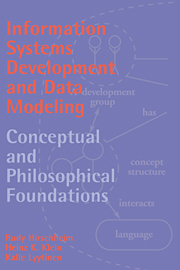Book contents
- Frontmatter
- Contents
- Preface
- Acknowledgements
- 1 Introduction
- 2 Definition and Evolution of Information Systems Development Methodologies and Data Modeling
- 3 Philosophical Foundations
- 4 Conceptual and Paradigmatic Foundations of ISD
- 5 Paradigmatic Analysis of ISD Methodologies
- 6 Conceptual and Paradigmatic Foundations of Data Modeling
- 7 Paradigmatic Analysis of Data Modeling Approaches
- 8 Conclusions
- Appendix A Summaries of Selected Methodologies
- Bibliography
- Index
2 - Definition and Evolution of Information Systems Development Methodologies and Data Modeling
Published online by Cambridge University Press: 05 November 2011
- Frontmatter
- Contents
- Preface
- Acknowledgements
- 1 Introduction
- 2 Definition and Evolution of Information Systems Development Methodologies and Data Modeling
- 3 Philosophical Foundations
- 4 Conceptual and Paradigmatic Foundations of ISD
- 5 Paradigmatic Analysis of ISD Methodologies
- 6 Conceptual and Paradigmatic Foundations of Data Modeling
- 7 Paradigmatic Analysis of Data Modeling Approaches
- 8 Conclusions
- Appendix A Summaries of Selected Methodologies
- Bibliography
- Index
Summary
Introduction
The purpose of this chapter is two-fold: firstly, the chapter suggests a set of terms and concepts to describe and converse about information systems development which is independent of any particular or preferred way of dealing with it. Not surprisingly, as the IS field evolved, many different and sometimes inconsistent uses of terms to describe key notions appeared. For example, the part of the organization that is targeted for change through an IS development project is variably referred to as utilizing system, domain of change, target system, or universe of discourse. We shall use the term object system to cross-relate these terms coming from different sources. The concepts proposed in this chapter were selected with two requirements in mind:
(1) they should be maximally consistent with the literature base; and
(2) they should serve as a compass directing us deeper into the underlying philosophical issues often ignored in the literature on ISD.
Secondly, the chapter provides a brief overview of the history of information systems development and data modeling. This analysis serves as a historical background for understanding the origins (genealogy) of theoretical concepts and definitions offered in the chapter. It also provides the historical context for the more detailed treatment of specific systems development methodologies in chapter 5 and the analysis of data modeling approaches in chapter 7.
- Type
- Chapter
- Information
- Information Systems Development and Data ModelingConceptual and Philosophical Foundations, pp. 10 - 45Publisher: Cambridge University PressPrint publication year: 1995



